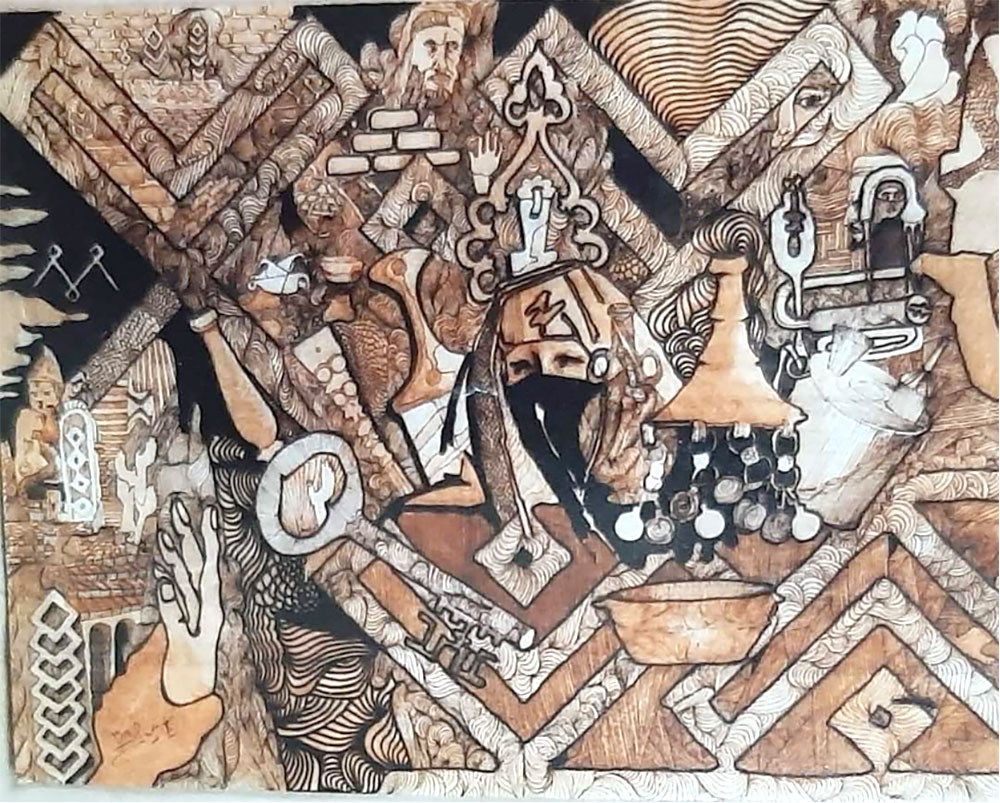"I am the sole daughter among five sons. I am illiterate. I got married at the age of sixteen and got divorced at the age of eighteen. I have two twin daughters. After the divorce, I returned to my family's house, only to be treated as a servant and slave by my brothers and their wives. My brothers took advantage of my lack of education and said that my divorce makes me responsible for anything that might happen to my daughters, so they took my daughters from me and returned them to their father. I was deprived of education, of my daughters, of being remarried, and of inheritance...".
These words form just a fraction of what Fathia Abdullah, 50, shared with Raseef22, and her story is but one of hundreds of stories we hear about in Yemen. However, there are still many Yemeni women whose stories remain untold and unheard due to societal (familial or tribal) constraints and the inherent injustice within the legal framework.
 The work of the late Yemeni visual artist Yassin Ghaleb
The work of the late Yemeni visual artist Yassin Ghaleb
Yemeni laws contain dozens of discriminatory legal texts against women. This report examines several such provisions, focusing specifically on the Personal Status and Nationality Law, as well as the Crimes and Penalties Law.
Explicit legal discrimination against women
Yemeni laws, including the Personal Status Law and the Crimes and Penalties Law, uphold flagrant gender-based discrimination, as they include provisions that perpetuate domestic violence and abuse, and enforce male guardianship over women. According to Human Rights Watch's 2021 global report, Yemen continues to subject women to "severe discrimination in law and practice." For consecutive years, Yemen has ranked amongst the lowest countries on the Global Gender Gap Index compile by the World Economic Forum.
"I was deprived of education, of my daughters, of being remarried, and of inheritance..." These narratives from Yemeni women underscore the repercussions of "discriminatory laws," creating an unbalanced environment and an unsafe society for women
The Yemeni Personal Status Law contains discriminatory provisions replete with gender bias in matters concerning marriage, divorce, child custody and decisions pertaining to children. Article 15 of the Personal Status Law prohibited the marriage of girls under the age of 15; however, Amendment No. 24 of 1999 eliminated this age restriction. As per UNICEF's 2017 statistics, over two-thirds of Yemeni girls were married before turning 18 in contemporary times, compared to 50% prior to the outbreak of conflict.
In the same context, Article 16 stipulates that marriage contracts are formalized between the man and the woman's guardian in an exclusively male council, in which the offer for marriage and acceptance take place between the men, disregarding the woman's input and her right to establish conditions for the marriage contract, as confirmed by a Yemeni lawyer and activist to Raseef22.
Fathia bitterly adds, "My brothers refused to marry me to anyone who would propose to me because they wanted me to remain in the service of my mother and prevent the birth of a son who might someday claim my inheritance."
According to Article 42 of the Child Rights Law, a woman is not entitled to guardianship over her children, as the father is the designated legal guardian of the children. In the event of the father's demise, guardianship is transferred to the paternal grandfather.
Yemeni lawyer and human rights activist Wedad Ahmed believes that this impedes women's authority to make decisions about their children. As per the law, fathers can terminate a woman's custody of her children on the pretext of lack of qualification or if she marries another man.
Article 40 of the Personal Status Law also limits women's freedom of movement. She is not allowed to go out without her husband's permission, and in many cases, husbands choose to be controlling and abusive even if the wife just wants to visit her family.
According to the Yemeni constitution, Article 3 stipulates that "Islamic Sharia is the source of all legislation", resulting in Yemeni women inheriting half of what men do, as stated in the provisions of the Personal Status Law . Former Minister of Human Rights Houria Mashhour tells Raseef22 that what is happening on the ground is that "many Yemeni families deceive women in terms of inheritance" giving them marginal land of little value instead of arable land or not providing their full inheritance rights.
Citizenship requires equality among all in terms of rights and duties, a principle undermined by laws that diminish women's rights in favor of men. The reality for women in #Yemen is in stark contrast to this principle
Fathia recalls the suffering she went through and is still experiencing, “After the death of my father, my brothers deprived me of my inheritance, because during the distribution of the inheritance, I was not informed, and they appointed someone to represent me. After 27 years, they brought me the documents for the land ownership, in which I get only less than a quarter of my share of the land and does not allow me to dispose of it or sell it. After 27 years, they presented me with ownership documents for the land, which was less than a quarter of my rightful share, restricting my ability to sell or dispose of it. Two years ago, after my mother's death, they filed a case against me because my mother had given me her share of her father’s house so I could live in it for the remainder of my life. Even though she had previously forfeited other pieces from her inheritance to my brothers, they wanted more. I told the judge that I wanted my share of the inheritance my father left, but he has not ruled anything in my favor until now.”
In a related context, the Yemeni Criminal and Penal Code incorporates numerous discriminatory clauses, which Wedad Ahmed explains "reinforce violence against women, infringe upon their rights, diminish their existence, and create an imbalanced environment and unsafe society for women."
For instance, Article 42 stipulates that compensation paid to a female victim is half that of a male's. Article 232 allows a man to kill his wife or female offspring if found in an adulterous situation. The law doesn't extend the same right to women. Houria Mashhour points out that a question was posed during a discussion about the text of this article: What if the opposite happened and the woman had caught her husband in the act of adultery and killed him? She replied that they were told that she would be killed for killing him, , displaying clear discrimination "because in reality, the human soul is the same and the act being committed (killing) is the same in both cases."
Similarly, Article 59 of the Crimes and Penalties Code states, "there is no punishment for the origin in its tributary," invoking memories of the killing of the 12-year-old girl, Maab, at the hands of her father.
Contradictions and conflicts
Article 6 of the Yemeni constitution stresses the need to uphold international agreements ratified by Yemen, and Article 41 stipulates the equality of all citizens. The constitution was amended by introducing Article 31, which states that women are "sisters of men, with rights and responsibilities stipulated and mandated by Sharia and the law." Notably, the wording of Article 31 has subtly diluted the essence of equality in Article 41, to the point that it could even be argued that it undermined the guarantee of women's equality for men. A report by Amnesty International considered that this article supports the idea of male domination over women.
Despite all of the above, Wadad Ahmed believes that "the Yemeni constitution ranks among the best in the Arab world" in terms of women's rights. She adds that the problem lies in the laws that discriminate between men and women, which leads to a problem for lawyers when addressing the defense of women who are subjected to legal discrimination. This involves not only failing to contest that these laws are unconstitutional on the one hand, but also judges' neglect in recognizing the significance of adhering to international treaties on the other hand.
Yemeni lawyer Arwa Al-Shamiri tells Raseef22 that the issue stems from – in addition to the existence of legal texts that discriminate against women – the absence of legal provisions safeguarding women or legal clauses prohibiting discrimination against them.
According to the Convention on the Elimination of All Forms of Discrimination against Women (CEDAW), societal and cultural norms contribute to numerous violations of women's rights, and “States are obligated to adopt appropriate measures to eradicate these norms and prevent discrimination on the basis of gender, as well as intersectional discrimination and gender-based violence, along with other related human rights violations."
In a parallel vein, Yemeni journalist Hoda Al-Harbi points out that the laws pertaining to women in Yemen are largely "superficial," as they are dictated by unjust customs and traditions. In this context, it's important to note that custom is legally recognized as a source of law according to Article 1 of the Civil Code .
"In addition to the existence of legal texts that discriminate against women, the issue stems from the absence of legal provisions safeguarding women or legal clauses prohibiting discrimination against them"
Feminist attempts to change the laws
At the heart of all these contradictions are feminist attempts and efforts to change the discriminatory laws against women. Former Minister Houria Mashhour confirms that the National Women's Committee (a governmental body affiliated with the Council of Ministers) conducted a comprehensive review of the national legislative framework between 2002 and 2004. This review exposed numerous provisions that overtly discriminated against women, encompassing both the Personal Status Law and the Crimes and Penalties Law.
She further highlights that some discriminatory laws have been amended, including the Nationality Law, which once denied Yemeni women married to foreigners the right to pass on their nationality to their children. Although this clause has been altered, some government bodies are still not acknowledging or implementing it, as per complaints lodged by several women.
Meanwhile, Al-Harbi highlights that despite women's movements advocating for gender equality and amendments to the Yemeni constitution, their voices often fall on deaf ears among policymakers who hold significant sway in perpetuating the marginalization and oppression of women.
Simultaneously, the urgency to reform discriminatory laws against Yemeni women becomes ever more pronounced. This is essential to secure their rights and ensure the practical enforcement of these rights. True citizenship necessitates equal rights and responsibilities for all, a goal that remains elusive within a legal framework that undermines women's rights in favor of men.
Raseef22 is a not for profit entity. Our focus is on quality journalism. Every contribution to the NasRaseef membership goes directly towards journalism production. We stand independent, not accepting corporate sponsorships, sponsored content or political funding.
Support our mission to keep Raseef22 available to all readers by clicking here!
Interested in writing with us? Check our pitch process here!



